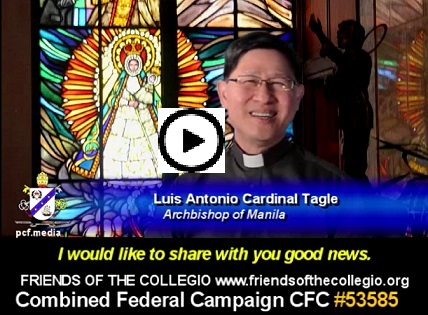WELCOME!
Inaugurated by Blessed Pope John XXIII in 1961, the Collegio is the “Home in Rome” of Filipino secular diocesan priests, carefully chosen and formally sent by their respective bishops to pursue further studies in the different ecclesiastical centers in Rome.
Priests at the Collegio may specialize in Theology, Philosophy, Canon Law, Sacred Scriptures, Liturgy, History, Communications, Patristics, and other fields, taking up either the Licentiate (a degree higher than the Master’s) or Doctoral degrees, for a period of generally two to four years.
A Rector, a Vice-Rector/Procurator and a Spiritual Director form the Collegio‘s group of Administrators. As Administrators of a Pontifical institution, they report to the Holy Father, through the Vatican’s Congregation (or office) for the Clergy. They also report directly to the Catholic Bishops’ Conference of the Philippines, which has an Episcopal Commission on the Collegio.
Priests in Rome live sub umbra Petri (literally, “under the shadow of Peter), close to the Holy Father physically, spiritually and doctrinally. They can regularly see the Pope, at least from afar, and have relatively easy access to ceremonies he presides over.
Likewise, Collegio priests have direct contact with the memory of early Christians and saints, receive classes at Pontifical institutions from leading professors from different countries, interact with priests from different continents and cultures, and exercise their ministry with the Filipino diaspora and with the local Churches in Italy and nearby countries.
During their Roman sojourn, whenever their academic commitments allow, the priests of the Collegio make themselves available to exercise their ministry with the Filipino diaspora and seek to know and obtain a most useful pastoral experience with the local Churches in Italy. During Christmas, Holy Week and summer breaks, they may continue their exposure in Italy, in the Holy Land, or in the different countries of Europe or America, doing pastoral work, studying other languages, or undertaking some other priestly endeavors.
Furthermore, they can learn foreign languages, and with their knowledge of Italian, they can have a more direct and immediate access to Church information, documents and pronouncements, especially those made orally or issued to news agencies in Italian. Such advantages of studying in Rome can hardly be obtained in the Philippines or in other countries.
His Eminence, Luis Antonio Card. Tagle, former Archbishop of Manila and currently Prefect of the Vatican’s Congregation for the Evangelization of Peoples, was for four years Chairman of the Episcopal Commission on the Pontificio Collegio Filippino (of the Catholic Bishops’ Conference of the Philippines).
Pope John XXIII said as he blessed the Collegio in 1961, “these buildings destined for the formation of your students in sacred sciences will be like channels by which Catholic life will be promoted among you, and the bond by which the Philippines, a Nation very dear to us, will more intensely be linked with the supreme Magisterium of the Church.”
(all pages in this website
COPYRIGHT 2010 to present
by Pontificio Collegio Filippino)

